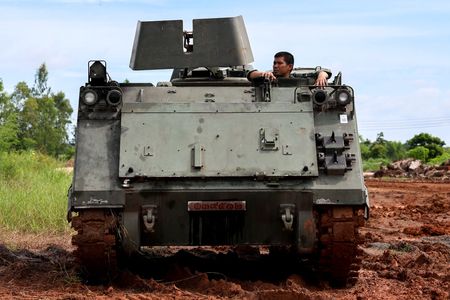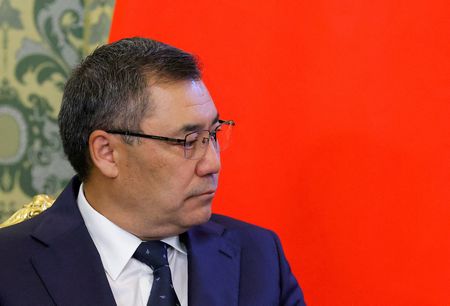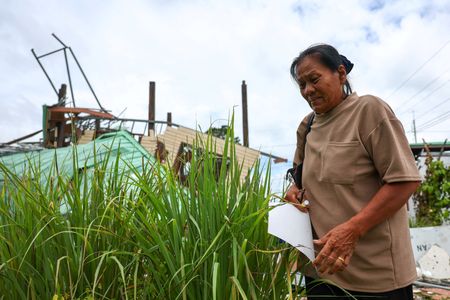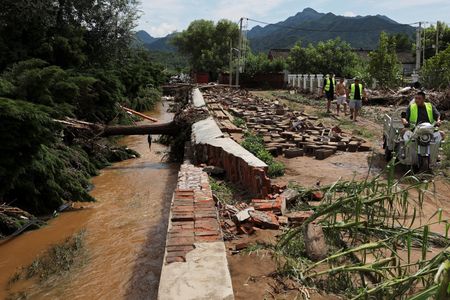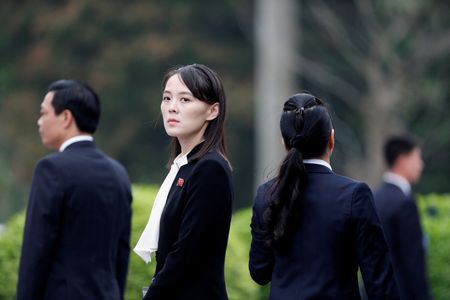By Panu Wongcha-um and Panarat Thepgumpanat
BANGKOK (Reuters) -A ceasefire between Thailand and Cambodia held on Monday and military commanders from both sides met to discuss measures to maintain the truce, as some residents along the disputed frontier trickled back home after five days of intense fighting.
Thai and Cambodian leaders met in Malaysia on Monday and agreed to a ceasefire to halt their deadliest conflict in more than a decade, which has killed at least 43 people, many of them civilians, and displaced over 300,000 in both countries.
Border areas remained calm, Thailand’s acting Prime Minister Phumtham Wechayachai told reporters in Bangkok, although he accused Cambodian troops of violating the ceasefire early on Tuesday, which had been flagged in complaints to Malaysia, the United States and China.
Cambodia denied the charge, insisting its troops had strictly abided by the ceasefire since midnight and continued to uphold it, according to a statement by Defence Minister Tea Seiha.
Despite the initial jitters, military commanders from both sides held talks and agreed to maintain the ceasefire, stop any troop movement, and facilitate the return of the wounded and dead, Thai army spokesman Major-General Winthai Suvaree said.
Each side will establish a coordinating team of four to resolve any problems, Winthai told reporters.
Further negotiations will continue at a meeting of the General Border Committee, which coordinates on border security, ceasefires, and troop deployments, scheduled for August 4 in Cambodia, the Thai army said. The committee includes the defence ministers and senior military commanders from both countries.
In a statement, the Thai army said it had detained 18 Cambodian soldiers who surrendered and provided basic provisions to them, including food and water.
A Cambodian defence ministry spokesperson did not immediately respond to Reuters questions on the detentions.
Both militaries have agreed not to deploy more troops along their disputed border, said Lim Menghour, Director-General of the Commission on Foreign Affairs and International Cooperation of the National Assembly of Cambodia, who also underlined the need for international observers to monitor the ceasefire.
Malaysia’s Defence Chief General Mohd Nizam Jaffar led a delegation to Thailand and Cambodia on Tuesday, the Malaysian army said in a statement, while a Chinese military spokesman said Beijing will maintain close communication with both countries to help consolidate the consensus over the ceasefire.
TALKS AND TRADE
Thailand and Cambodia have wrangled for decades over their disputed frontier and have been on a conflict footing since the killing of a Cambodian soldier in a skirmish late in May, which led to a troop buildup on both sides and a full-blown diplomatic crisis.
Monday’s peace talks came after a sustained push by Malaysian Premier Anwar Ibrahim and U.S. President Donald Trump, with the latter warning Thai and Cambodian leaders that trade negotiations would not progress if fighting continued.
Thailand and Cambodia face a tariff of 36% on their goods in the U.S., their biggest export market, unless a reduction can be negotiated. After the ceasefire deal was reached, Trump said he had spoken to both leaders and had instructed his trade team to restart tariff talks.
Pichai Chunhavajira, Thailand’s finance minister, said on Tuesday that trade talks with Washington were expected to be concluded before August 1.
Thailand has estimated an initial damage from the border conflict at more than 10 billion baht ($300 million), Pichai said, adding the government is preparing a budget of at least 25 billion baht to mitigate the economic impact.
The government has also rolled out various relief measures to help those affected, including soft loans, loan repayment deferrals and tax breaks, he said.
Daily activity resumed some parts of Thailand’s border areas, including the Kantharalak district, about 30 km (20 miles) from the frontline, where Chaiya Phumjaroen, 51, returned to town to reopen his shop.
“I am very happy that a ceasefire happened,” he said. “If they continue to fight, we have no opportunity to make money.”
The ceasefire deal reflected a rare convergence of interest between the U.S. and China, which also pushed for the talks, but the agreement remained fragile, and third-party monitoring was essential to keep it in place, said Thitinan Pongsudhirak, a political scientist at Bangkok’s Chulalongkorn University.
“It cannot be left to Thailand and Cambodia to implement because the hostilities are running so deep now.”
(Reporting by Panu Wongcha-um, Panarat Thepgumpanat and Chayut Setboonsarng in BANGKOK, Shoon Naing in KANTHARALAK and Zaw Naing Oo and Chantha Lach in ODDAR MEANCHEY; Additional reporting by Orathai Sriring, Poppy McPherson and Juarawee Kittisilpa in BANGKOK, and Danial Azhar in KUALA LUMPUR; Writing by Devjyot Ghoshal; Editing by John Mair and Raju Gopalakrishnan)

